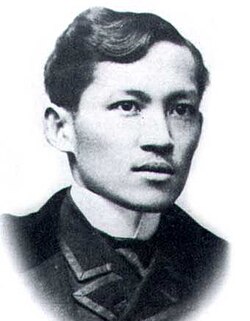
Source: Wikipedia
So… yesterday was José Rizal’s birth anniversary, June 19. I knew, kinda. My friend at Pinoy Reads Pinoy Books (PRPB) even held a draw of this Pinoy book in celebration of Rizal’s birthday and I won, and still it hasn’t sunk in until I saw the daily quote in Goodreads featuring Rizal’s. Yes, I can be that dense.
In any case, Rizal’s birthday is not something Pinoys forget in the first place. I’ve been an admirer of Rizal since I was a kid, and I mean long before I can even read. My earliest memory of him was of my grandmother telling me about the things he did for the country. I was two.
Rizal was a polymath, a renaissance man. He was this guy who wrote and published poems, essays, novels, plays. I saw some of his paintings, sketches, sculptures, and woodcarvings in I think at least two museums in Manila otherwise I wouldn’t have been this impressed in his skills in art.
Because. He had serious skills and I believe he could have made a living being a sculptor or a painter like Juan Luna or Félix Resurrección Hidalgo had he not been too busy being an ophthalmologist, writing, learning other languages, curing himself of tuberculosis, discovering species (subsequently named after him), traveling, saving the country, inciting a revolution, and breaking the ladies’ hearts from each and every country he visited.
In addition, José Rizal was a Master Mason, an educator, farmer, historian, playwright, and journalist who dabbled, with varying degrees of expertise, in architecture, cartography, economics, ethnology, anthropology, sociology, dramatics, martial arts, fencing, and pistol shooting (Source: wikipedia).
He said in 1888:
“Man is multiplied by the number of languages he possesses and speaks.”

A large replica of Rizal’s The Triumph of Science over Death, also known as Scientia. The original work is a clay sculpture made by José Rizal as a gift to his friend Ferdinand Blumentritt.
Location: in front of Fernando Calderón Hall of the University of the Philippines College of Medicine
Photo source: https://s-media-cache-ak0.pinimg.com/736x/f6/44/08/f64408e5f702174711ca3e4fbe9e19da.jpg
credits to the owner of the photo.
A polyglot, Rizal was said to be conversant in as many as twenty two languages, namely: Spanish, French, Latin, Greek, German, Portuguese, Italian, English, Dutch, Japanese, Arabic, Swedish, Russian, Chinese, Greek, Hebrew and Sanskrit; and the local languages Malay, Chavacano, Visayan, Ilocano and Subanun. Why Tagalog/Filipino was not included in the list, I do not know. Having been born and raised in Calamba, it’s got to be the first language he learned alongside Spanish.
Rizal wanted to be a lawyer, but because his mother was going blind, he switched to medicine (ophthalmology) and proceeded to perform a successful eye operation on his mother.
It was not surprising that he wanted to be a lawyer though. He wanted to fight for the rights of the Filipino people after all, and he did. In his own way he showed that the Filipinos deserve to learn, that our people have the capability, by being exemplary himself, at the cost of his own life.
At the age of 35, Rizal was executed by firing squad on December 30, 1896 at Bagumbayan, in Manila.
With that said, I want to end this post by enumerating some of Rizal’s quotes from his works that I love. The first two in the list never fail to bring tears to my eyes because of the painful truth it represents.
- “Ang bayan po’y di dumaraing dahil siya’y pipi, di tumitinang dahil natutulog. Subali’t darating ang panahong malalantad ito sa inyo atmapapakinggan ang kanyang mga panaghoy. Pagsapit ng araw na ito,… sasambulat sa lahat ng dako ang mga naipongluha; himutok at buntong-hiningang matagal na panahong kinimkim sa puso ng bayan.” – Pilosopo Tasyo (kab. 25)
English translation: “The people do not complain because they have no voice; do not move because they are lethargic, and you say that they do not suffer because you have not seen their hearts bleed.” ― Noli Me Tangere (Touch Me Not)
- “Mamatay akong hindi man lang masisilayan ang pagbubukang liwayway, kayong makakakita, batiin n’yo s’ya at wag kalimutan ang mga nabulid sa gitna ng dilim.” – Elias (kab. 63)
English translation: “I die without seeing the dawn brighten over my native land. You who have it to see, welcome it … and forget not those who have fallen during the night!”
- “On this battlefield man has no better weapon than his intelligence, no other force but his heart.”
- “One only dies once, and if one does not die well, a good opportunity is lost and will not present itself again.”
- “Tingnan mo ang mahinang tangkay na iyan. Siya’y yumuyuko kapag umiihip ang hangin na parang ikinakanlong ang sarili. Sapagkat kung siya’y magpapakatigas sa tayo, mababakli siya at malalagas ang kanyang mga talulot. Kaya pararaanin niya ang hangin sika siya muling tutuwid na taglay ang kanyang mga talulot. ” – Pilosopo Tasyo (Kab. 25)
- ” … Ang karunungan ay para sa tao, ngunit huwag mong lilimuting iya’y natatamo ng mga may puso lamang.” – Gurong Pari (kab. 8)
- “He who does not know how to look back at where he came from will never get to his destination.”
- Filipinos don’t realize that victory is the child of struggle, that joy blossoms from suffering, and redemption is a product of sacrifice.
Want to know more about Rizal? Click the links below:
